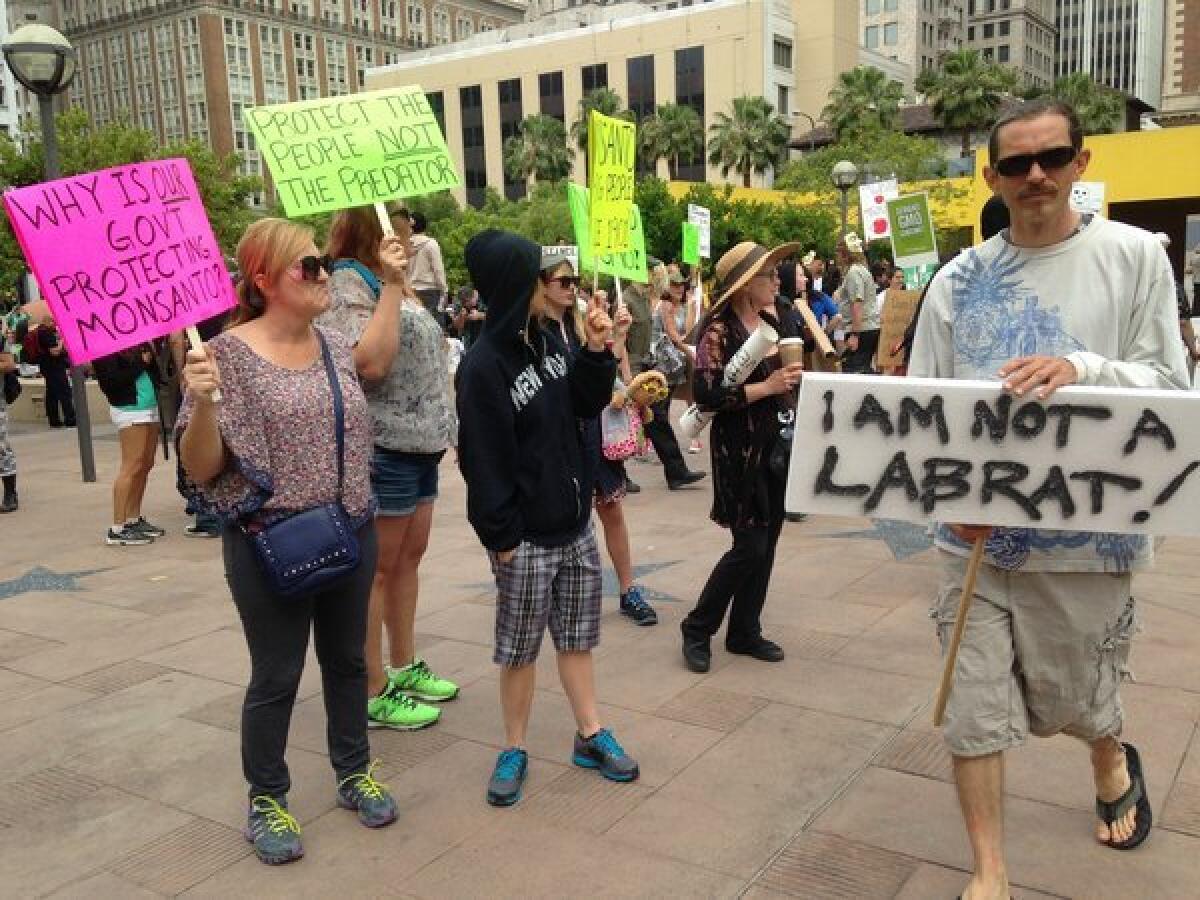Hundreds in L.A. march in global protest against Monsanto, GMOs

Hundreds of protesters took to the streets in downtown Los Angeles on Saturday as part of a global series of marches against seed giant Monsanto Co. and genetically modified foods.
Organizers said the “March Against Monsanto” demonstrations were being held in some 300 cities in more than 44 countries this weekend. The event -- a social media-generated call to action against genetically modified foods and the multinational corporations that produce them -- marked the first such global, unified protest for this cause, organizers said.
In Pershing Square in downtown L.A., a diverse crowd marched toward City Hall at about 11 a.m. Many carried colorful signs with messages such as “Label GMOs, it’s our right to know” and “Real Food 4 Real People.” One adult protester arrived in a cow-print onesie and a sign that said: “Happy cows do not eat GMOs.”
The event temporarily closed Hill Street between 1st and 5th streets as the group marched to City Hall. Rallies and speeches will be held until 5 p.m. Saturday, with volunteers distributing information about health and political concerns regarding genetically modified foods, said Dorothy Muehlmann, 30, of Corona, who organized the L.A. march with about 30 volunteers and help from groups such as Occupy L.A. and Anonymous.
“We’re marching to raise awareness,” she said. “This is not just a ‘boo Monsanto’ protest. We want more people to know so they can make their own decisions.”
Monsanto, a multinational firm based in St. Louis, told Associated Press on Saturday that it respects people’s rights to express their opinions on the topic, but stands by the seeds it sells. The seeds help farmers produce more from their land while conserving resources such as water and energy, Monsanto said.
Muehlmann said the issue has gained momentum in the last year, particularly after the defeat of Proposition 37, a ballot measure last November that would have made California the first state in the nation to require labels on some fresh produce and processed foods, such as corn, soybeans and beet sugar, whose DNA has been altered by scientists.
Opponents of Proposition 37 successfully argued that it was expensive, bureaucratic and full of illogical loopholes for certain foods, such as meat, dairy products, eggs and alcoholic beverages. The measure was defeated with 51.4% of voters casting ballots against it. Despite the measure’s defeat, supporters said the concerns of the millions who voted for it remained valid.
“We believe it’s a dynamic moment for the food movement, and we’re going forward,” he said.
The debate over genetically engineered food has been going on since the crops became widespread in the mid-1990s. In 1992, the FDA concluded that there was no difference between genetically engineered and non-engineered plants.
On Thursday, the U.S. Senate rejected – by a vote of 71 to 27 -- an amendment to let states require labels on food or beverages made with genetically modified ingredients. Many at Saturday’s rally in L.A. said the Senate’s action added political urgency to their cause.
“Someone has to stand up for it, and obviously I’m not standing alone,” Muehlmann said, looking at the hundreds around her banging drums and drawing more signs. One waved a poster saying, “Don’t let corporate greed dictate your health.”
Local protesters Saturday rallied across Southern California, including in Venice, Long Beach and San Diego, organizers said.
[For the record, 2:05 p.m., May 28: An earlier version of this post said 53% of voters last November opposed Proposition 37. The ballot measure was opposed by 51.4% of voters.]
ALSO:
1,850 pounds of pot seized from boat in Manhattan Beach
Solution near for guano stink from La Jolla shoreline, mayor says
Setting Times stories to music: From Nick Cave to Dionne Warwick
Twitter: @RosannaXia
rosanna.xia@latimes.com
More to Read
Sign up for Essential California
The most important California stories and recommendations in your inbox every morning.
You may occasionally receive promotional content from the Los Angeles Times.











